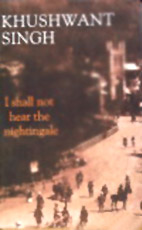This book I Shall Not Hear The Nightingale` by Khushwant Singh has revealed an unexplored side of Indian history, which is very painful. This is the characteristic of Khushwant his style of storytelling is his achievement. This book contains much tragedy along with some humor. This creation by him is unique in much part and it is regarded as landmark in Indian history.
Khushwant Singh is popularly known as a journalist who was born in 1915 in Hadali, in Punjab. He was educated at Government College, Lahore and later at King`s College and the Inner Temple in London. He began his career as a journalist with the All India Radio in 1951. Singh started the magazine Yojna and edited it during the years 1951-53. After some days he served as the editor of the Illustrated Weekly of India during the late 1970s. This was a landmark change in his life. Singh went on to become editor of the Hindustan Times during the years of 1980-83. In today`s era he is India`s best-known columnist and journalist. Khushwant Singh has had a very successful career as a writer. Among the works he has published some have got real hype and these can be mentioned as two-volume History of the Sikhs, Delhi, Train to Pakistan and `The Company of Women`, and also a number of translated works and non-fiction books on Delhi, nature and current affairs. Khushwant Singh was also the elected Member of India`s Parliament i.e. Rajyasabha from 1980 to 1985. His works on Sikh History are perhaps most authoritative works on the topic
Synopsis:
 `I Shall Not Hear The Nightingale` by Khushwant Singh is a story of a Sikh family in the days before India`s independence. The story is set at the backdrop of 1942. Buta Singh is the father in the story. He is the head of the family and is a magistrate who works for the British, and after years of loyal service to the British Raj is expecting to be honored with a title in the King`s Birthday Honours List. The son, Sher Singh is a hot-blooded young revolutionary, but emotionally still a child. He has joined a band of terrorists and comrades and in order to acquire the leadership has hatched a plan to disrupt arms supplies traffic on road and rail through bombing, and all this rebellion is undetected by any member of the family. Hell breaks loose when a ghastly murder of the village headman is reported and Sher Singh is arrested. All this sends an earthquake through the foundations of Buta Singh`s house. I Shall Not Hear The Nightingale gives the reader a window into the world of this family caught up in changing times and the turmoil they endure. It is a unique look at the relationship of the British masters with those Indians who were loyal to them, at the unscrambling of that relationship, and at the heartbreaking devastation it brought to the families of Punjab. This helps a lot for those who are interested in Indian history, culture, and psyche. All Britishers, Indians and Pakistanis should read it. It would help the readers to open up their mind and to get the thing what is what.
`I Shall Not Hear The Nightingale` by Khushwant Singh is a story of a Sikh family in the days before India`s independence. The story is set at the backdrop of 1942. Buta Singh is the father in the story. He is the head of the family and is a magistrate who works for the British, and after years of loyal service to the British Raj is expecting to be honored with a title in the King`s Birthday Honours List. The son, Sher Singh is a hot-blooded young revolutionary, but emotionally still a child. He has joined a band of terrorists and comrades and in order to acquire the leadership has hatched a plan to disrupt arms supplies traffic on road and rail through bombing, and all this rebellion is undetected by any member of the family. Hell breaks loose when a ghastly murder of the village headman is reported and Sher Singh is arrested. All this sends an earthquake through the foundations of Buta Singh`s house. I Shall Not Hear The Nightingale gives the reader a window into the world of this family caught up in changing times and the turmoil they endure. It is a unique look at the relationship of the British masters with those Indians who were loyal to them, at the unscrambling of that relationship, and at the heartbreaking devastation it brought to the families of Punjab. This helps a lot for those who are interested in Indian history, culture, and psyche. All Britishers, Indians and Pakistanis should read it. It would help the readers to open up their mind and to get the thing what is what.
The Greenwood Press Reprint publishes this book by Khushwant Singh in the year of 1969.













